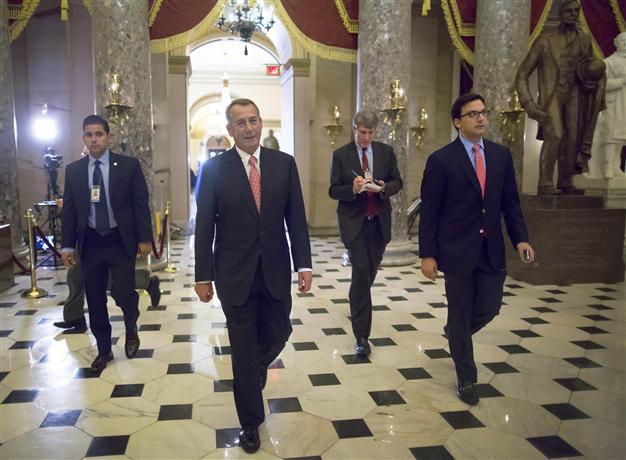US House approves $1.1 trillion spending bill, averts shutdown
WASHINGTON - Agence France-Presse

The U.S. House of Representatives passed a $1.1 trillion spending bill late on Thursday to fund most federal agencies through Sept. 30, the end of the current fiscal year. REUTERS Photo
Facing intense pressure to avoid a government shutdown, the US House of Representatives narrowly passed a $1.1 trillion federal spending bill Dec. 11, sending it to the Senate after it was ushered through barely two hours before a midnight deadline.The 219-206 vote followed a bruising day of arm-twisting by the White House after dozens of Democrats revolted over pro-Wall Street and campaign-finance riders in the bill, dramatically splitting with President Barack Obama over the legislation that funds most federal operations through September.
Senate Majority Leader Harry Reid said after the vote that his chamber will take up the must-pass legislation Friday.
Congress passed a two-day extension to keep government open beyond Thursday's witching hour so that the Senate can debate and vote on the measure.
The spending package, which would fund most federal operations through September 30, the end of the 2015 fiscal year, was the focus of extraordinary brinkmanship in Congress, a fitting cap to one of the most polarized eras in Washington.
The deal almost did not happen, forcing the White House and Obama, who came out in favor of the measure, into near-panic mode as they scrambled to get enough Democrats on board.
House Speaker John Boehner was forced to suspend proceedings in the chamber when he realized he was short, fueling a rancorous Capitol Hill showdown.
Progressive Democrats were furious over a clause buried deep in the 1,603-page bill that rolls back key financial regulations on Wall Street.
Top House Democrat Nancy Pelosi joined the revolt.
In a stunning rebuke of Obama on the House floor she blasted as "blackmail" the effort to shred reforms in the so-called Dodd-Frank law that prevent big banks from making risky derivatives trades protected by taxpayer-insured funds.
Pelosi and others argued that the change opens the door to another big bank bailout that rescued foundering financial institutions during the worst of the Great Recession. That, Democrats fear, could lead to a repeat of conditions that fueled the financial crisis of 2007-2008.
Democrats are also angered by a rider which would dramatically expand the amount that wealthy individuals can contribute to political parties -- a move which would undercut campaign finance reforms from 2002.
Senior House Democrat Steve Israel warned that the two provisions were poison pills "that Democrats can't swallow," and said he hoped Boehner would strip them out and start anew.
Ultimately, 57 Democrats joined most Republicans in supporting the measure.
Democratic congresswoman Maxine Waters was furious about the provisions, and suggested she was unimpressed by the White House dispatching chief of staff Denis McDonough to the US Capitol to persuade distressed Democrats about the bill.
"We don't like lobbying that is being done by the president or anybody else that allows us to... give a big gift to Wall Street," Waters boomed to reporters.
"We're going to fight it. We're fighting anybody who is lobbying to tell people to vote for this bill." Asked if McDonough swayed Democrats, congressman Bill Pascrell sneered, "absolutely not." Conservative Republicans, for their part, are angry that the bill takes no direct steps to block Obama's executive action on immigration, announced last month, that would shield millions from deportation.
As a compromise, the measure provides only two months of funding for the Department of Homeland Security, allowing the Congress -- which returns to full Republican control next year -- an opportunity to revisit funding for the agency that will handle Obama's immigration action.
Conservatives wanted a tougher approach to stopping what they call presidential overreach.
"With November's election a vague distant memory, the Republican-controlled House passed a bill that does nothing to stop the president's illegal and unconstitutional amnesty agenda," deplored conservative House Republican Tim Huelskamp, referring to last month's mid-term elections.
Such mega-laws are greased by backroom negotiating and often introduced at the last minute.
To expedite the process, lawmakers vote not on each amendment, but on the final text. The take-it-or-leave-it approach is a double-edged sword: approval can be swift, but rejection can trigger a government shutdown.
















